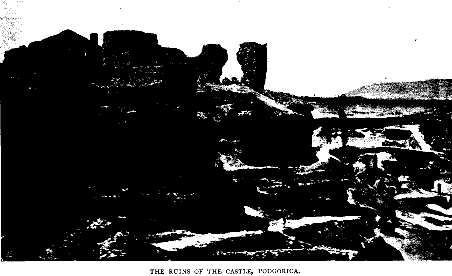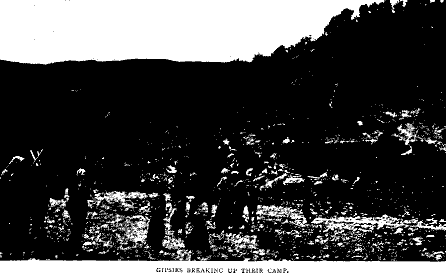
THE RUINS OF THE CASTLE, PODGORICA.
Montenegro
THE ROAD TO PLAVNICA

THE RUINS OF THE CASTLE, PODGORICA.
WE men of Zeta are ever prepared, but we are used to war," says the ragged youth leaning on his rifle. "I have fought in two border fights already."
It is a dismal marshy swamp on the banks of the broad Moraca. The rain is falling heavily, and I feel angered at the "vet," who insisted on my accompanying him this afternoon. I am sitting on a stool, my feet in two inches of rich slush, a huge cotton umbrella held over my head - in spite of remonstrances - by the ragged youth, while half a dozen women in a state of déshabille are regarding me curiously from the doors of their hovels.
A hundred yards away, amidst a group of men, stands the vet, and he is very busy. At the risk of being held effeminate, I have steadfastly refused to come nearer and watch him at his work, which is that of dissecting a deceased cow. The ring of men suddenly falls back, and there is much laughter, swearing, and lighting of cigarettes. The movement is explained directly afterwards, and I move to another spot to windward.
"You should really come and look," says the vet, approaching me, smearing lime over his hands. "I have never seen such an extraordinarily developed "
"It's no good," I say, "I am not in the least interested in your beastly details. Besides, I got a whiff just now."
317
![]()
"That was only the first moment," explains the vet, looking pained. Why does a doctor, whether for man or beast, always think the lay must be enthusiastic and eager to learn all the details of his profession?
An old man draws near and tearfully protests at the fortnight's quarantine imposed on his stock. He is the owner of the offensive cow.
"I shall starve," he exclaims. "They are my only source of income."
The vet soothes him as best he may and calls for our horses. A few minutes later we are plashing through the flooded paths towards the high road. Two men accompany us with rifles, into which they first slip a magazine. Even boys of fourteen or fifteen receive rifles from the Government in the Zeta. Yet the valley is one of the most beautiful and fascinating spots on the face of God's fair earth. It has a beauty that grows from day to day in intensity. At first sight the visitor sees nothing but a broad valley surrounded on all sides by lofty mountains. At midday it looks like this, because the glare of the sun turns the mountains into mere colourless barriers, and the valley into a seething furnace full of strange mirages, when the hillocks seem to be floating in the air, their corners turning upwards in quaint fashion. But at eventide a painter would go mad with delight, for he alone can read those glorious colours resting on the banks of mountains that soar up into the luminous sky. Let the majesty of this view at eventide once enter the soul of a man and Podgorica will be a lodestone to him for the rest of his days.
It is so this evening as we emerge on the road to Plavnica and head our horses towards Podgorica. The rain has mercifully ceased and clouds rest in gloomy masses on the
318
![]()
mountains of Albania and of the Kuc before us. From the downs of Fundina rises the base of a rainbow, but it ends abruptly. It is like a glorious memorial of the brave men who fell there in that fierce battle twenty-five years ago. I turn in my saddle and call the vet with a hasty exclamation. Strangest of contrasts, the sun is shining on the wild range behind us, turning the clouds into beds of snow, tinging them with crimson and gold. The waters of the great lake sparkle delightfully in the sunlight, and it is like turning from cruel but majestic winter to the delights of glorious summer.
We approach the bridge over the Cievna, now running broadly over a stony bed. On the near side is a ruined mill, and my thoughts turn to the reverse of this fair picture. Over this most wonderful of landscapes broods a grim spectre who exacts pitilessly his toll of human lives. It is the "Border Vendetta." They call the green sward, smooth as a billiard-table, stretching away to our right, "the Black Earth," and rightly too, for the sods are darkened with men's life-blood.
Once a prosperous miller lived on these banks, in this picturesque moss-grown mill. One night as he lay sleeping peacefully in his bed, Albanians came and shot him. They climbed on the roof and, moving the tiles away, they murdered him as he lay, with his wife at his side. His crime was that he belonged to the Zeta, that was all. We clatter over the bridge towards the han at the other end. Before it stands a pair-horsed carriage, and sitting at a table is a dignified man in the rich dress of the Montenegrin nobility. It is Spiro Popvic, governor of Podgorica and the Zeta. We join him and shake hands with the stern man beside him. They are the captains of the village districts around - men
319
![]()
used to fighting and in daily danger of their lives, for the life of one of them counts as the lives of five of the common peasants. The tally of deaths is carefully kept, and when the Albanians have more to their credit, then the men of Zeta rest not till they have equalized the score and gone one better. The governor's guard is squatting on the parapet of the bridge, his gaze fixed on the plain beyond. A group of men clad in rough sheepskins stand around, and each has a rifle.
We sit and talk and laugh. No one alludes even to the existing state of affairs. It is not considered polite or even interesting. They will even tell you there is no danger, forbidding you sternly the next moment to walk across the plain alone.
There is a little church not far away. That too was sacrilegiously broken into not long ago and the sacred vessels stolen. Now the bells ring the Angelus, and the armed men bare their heads and cross themselves.
The governor signs for his carriage.
"It is getting dusk," he says to us significantly. "You are coming too."
We mount and follow.
Podgorica is not far. It lies at the end of this straight stretch of smooth road, about half an hour away. Shallow hollows border the road on either side.
"They should fill them up," remarks the vet. "It is foolish to leave them so."
We pass two heaps of grey stones piled loosely on each other. They lie between these little indentations in the flat surface. The vet glances at me interrogatively and I nod in answer. He is asking me if I know the story of these grim monuments. It happened a year ago. Albanians left the town at nightfall, ostensibly to reach their homes in the
320
![]()

GIPSIES BREAKING UP THEIR CAMP.
![]()
mountains yonder, but in reality they hid in these hollows. Four Montenegrins passed an hour later, singing lustily. Then Podgorica was startled into life by the crash of two volleys, and a few disconnected shots. The blockhouse guards turned out, but they were too late to cut off the retreat of the murderers. A little later a man with four bullets in his body staggered into the town. Another escaped, but the cairns were erected at the spots where they found the remaining two. One corpse was lying on his face, his rifle stretched out before him, his finger pressing the trigger. He had died in the moment of aiming.
The men of Zeta boast that they die hard.
Now the shades are deepening. Darkness is descending like a pall upon this valley of the shadow of death, so majestic so grand, so incomparably mysterious when the sun slowly vanishes behind the most distant pile.
It is strange that what God has made so fair men should turn into such
a hell.
[Previous] [Next]
[Back to Index]